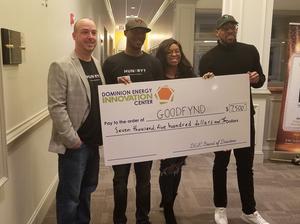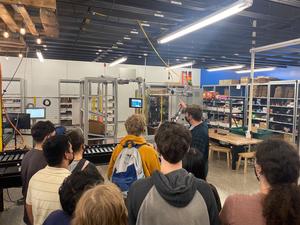
In an era with constantly changing technology and the ever-evolving need for skills to keep up with it, Data Society has found its niche in providing data science training and consulting to companies across industries.
These services come in the form of virtual and in-person courses for employees, assisting a company in transforming its data science programs and processes, and building systems for the company to continue using after training is done.
“Our raison d'etre is to empower organizations and their individual staff to be data science enabled and empowered in that way,” co-founder and COO John Nader said. “By having a team, and an executive team above them, trained in data science - in both technical and nontechnical competency - you’re empowered to do more interesting projects, and then as you implement those projects and promulgate them through the organization you need to make sure everybody understands how to use them to make them more effective. It's a virtuous cycle between the two.”
Data Society boasts an online course catalog of training modules focusing on both technical (ranging in experience levels from Intro to Excel, all the way to Convolutional Neural Networks) and nontechnical (think Intro to Data Science or Data Science Literacy). Nader says that a key to their success has been the development of their own content creation engine that builds lessons using real data from each individual client, which has allowed them to produce content at a rate of five hours of work per one hour of content, compared to the industry standard of 20 hours of work per one hour of content.
The company is based in D.C., Richmond and Los Angeles. Nader and co-founders Merav Yuravlivker, CEO, and Dmitri Adler, CDS, chose Richmond as the base because of its centralized location and D.C. for its access to federal clients.
Today, the whole team includes 30 members, plus an additional crew of 20 educators. Between 2018 and 2019, the company reported five times growth. Data Society is also fully bootstrapped.
“[Not relying on funding] is nice, because, as much of an evolving field as data science is, it means that we get to pivot and serve the needs as our clients see them at any given time,” Nader said. “We're not beholden to one business model or one particular line of revenue.”
The startup’s first major client was aerospace and defense company Northrop Grumman, to whom they delivered 700 trainings in the course of a year. Then-CEO Wesley Bush had issued an edict that the entire company needed to be equipped in data science to prepare for the growing needs of the tech industry, even those in nontechnical roles. Data Society won the bid for the resulting training programs, beating out names like IBM and KPMG.
Other major clients who have taken advantage of Data Society’s courses and consulting services include Comcast, government agencies like the Department of Commerce, Department of Health and Human Services and even NASA. Nader said many of their clients eventually return for additional trainings after completing an initial round.
And the trainings have resulted in real-life application.
One manager-level analyst at the National Institutes of Health, who was enrolled in Data Society courses through his work, created for his capstone project a system that used natural language processing and text mining to scan large documents and categorize them based on subject matter. As part of a team that analyzed grant proposals based on their abstracts, he had previously spent hours looking at these documents and categorizing them by hand. By applying the algorithm he created in the data science training, he was able to automate this process to occur almost instantaneously. This employee won the director’s award and was able to save the company the salaries of nearly four full-time employees with the time saved.
Data Society’s data science courses have even been recognized by the University of California-Riverside and can be applied for university credit. The company's staff is made up of a combination of data scientists and instructional design experts, and it has developed customized dashboards for instructors and managers to track course progress.
“People have to be lifelong learners now,” Nader said. “Education doesn't stop when you get your cap and gown. Of all the skills you could have, data science is, effectively, table stakes for a lot of careers. In this changing economy, with the growth of AI threatening jobs, we empower people to take their surfboard and be a part of the wave instead of having it wash over you.”




